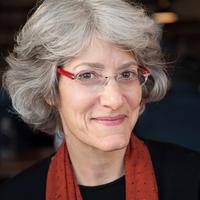On September 13, Rabbi Elana Zaiman addressed an enthusiastic Seattle Hadassah crowd to discuss her book, “The Forever Letter: Writing What We Believe for Those We Love.” The Salon took place in the gorgeous Mercer Island home of Barrie and Richard Galanti.
 |
 |
President Susan Adler recalled how nearly 4 years ago, the chapter board was installed in the Galanti’s beautiful living room, in which thirty-plus salon-goers were now seated. She then introduced Sarah Hilchie, who recently returned to Seattle after working for almost 11 years at UJA-Federation in New York City and has been serving for the past 2 years as Director of Major Gifts for American Friends of Magen David Adom (AFMDA). Sarah described the work of MDA — Israel’s medical, disaster, ambulance, emergency dispatch, stem cell, cord blood, breastmilk and blood bank service. She explained how MDA’s high-tech app can access Israel’s emergency services, allowing users to text silently for help in 6 languages while dispatchers can see the crisis through the cell phone camera and send the appropriate help. She spoke admiringly of Israel’s paramedics, who receive up to 3,500 hours of training. Citing example after example, she highlighted the partnership between Hadassah Medical Organization and MDA, demonstrating through her stories how advanced high-tech communication and training mobilizes paramedics and HMO doctors to make lifesaving decisions under extreme time pressure. “This is an exceptional partnership between two strong organizations who leverage their respective expertise to save lives every day”, Adler stated.

We next heard from Rabbi Elana Zaiman, author of The Forever Letter: Writing What We Believe for Those We Love. Her book is based on the ancient tradition of the “ethical will,” in which parents wrote to their children, passing on traditions and values. The rabbi asked us to introduce ourselves to the group and tell what inspired us to attend this salon, evoking poignant stories about letters written and received. She described the history of ethical wills and explained that the contemporary “forever letter” has become more of a personal loving gesture than a list of commands for their offspring to follow.
More than any time in our recent history” she said, “it’s important for families to share their love and support for one another.” While acknowledging that today’s generation may be less sentimental than their elders and definitely has less attachment to paper, Elana declared that writing a letter remains a powerful and therapeutic act, affecting the writer as much as the recipient. She shared the lasting impact of having received such a letter from her father and described how a forever letter can mend the past, whether left as a gift or as something to be shared in the present.
“Rabbi Zaiman is a treasure, so full of energy and downright friendliness,” said participant Ettie Davis. “She epitomizes how to listen. Her exuberance bounced off all of us privileged to be there. I was blown away by the incredible interest in the subject, especially from young women.”
Based on the group’s enthusiastic response, Seattle Hadassah will be organizing a four-hour workshop with Elana on writing our own “forever letters” sometime in 2019. Details will follow.
 Seattle Hadassah
Seattle Hadassah